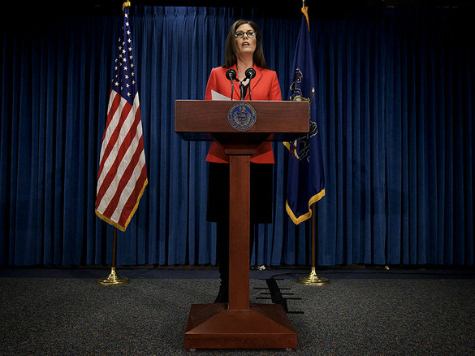
“If one man can be allowed to determine for himself what is law, every man can. That means first chaos, then tyranny.” –Supreme Court Justice Felix Frankfurter
Public corruption and abuse of office isn’t just a D.C. phenomenon. Corruption in the states is also endemic and more “in your face” than the typical D.C. scandal. So when Judicial Watch Attorney Michael Bekesha testified before the State Government Committee of the Pennsylvania House of Representatives on May 6, 2014, he didn’t pull any punches. Attorney General Kathleen Kane, Bekesha explained, had consistently refused to honor her sworn oath to uphold the constitution of the state, and he warned of dire consequences if she was allowed to continue abrogating the duly enacted laws of the Commonwealth.
As James Madison warned in Federalist 47, “The accumulation of all powers, legislative, executive, and judiciary, in the same hands, whether of one, a few, or many, and whether hereditary, self-appointed, or elective, may justly be pronounced the very definition of tyranny.” Attorney General Kane’s announcement on July 11, 2013, when Kane announced she would not defend Pennsylvania’s defense of marriage law, makes it clear that she believes that she has the authority to create, enforce, and interpret the law. In Attorney General Kane’s view, Pennsylvania is a tyranny of one, not a democracy.
Clearly, concisely, and forcefully Bekesha explained that Kane had violated her oath of office in not just one but four separate instances. In each case, he charged, she has shown “little respect for her office and the people of Pennsylvania.” (To review Bekesha’s testimony in full, click here.)
Bekesha was invited to testify about Kane’s malfeasance by the Chairman of the State Government Committee, Daryl Metcalfe. Citing Kane’s continuing refusal to uphold Commonwealth laws with which she disagrees, Metcalfe has initiated proceedings that ought to result in the Attorney General’s impeachment.
Bekesha suggested that Kane “must have had her fingers crossed” when she put her hand on the Bible and swore to “discharge the duties of my office with fidelity.” He advised the Committee members that since then she had taken it upon herself to “decide which laws she wants to uphold and defend.” He cited as proof four specific instances in which her actions spurned a 1973 Commonwealth Court ruling that “The Attorney General is without statutory authority to implement his opinion as to constitutionality:”
-
Attorney General Kane declared a duly enacted Pennsylvania law [against homosexual marriage] unconstitutional and announced that she would not “uphold and defend” it. Although her action in itself may not have been the suspension of the law, the result of her declaration was just that. Less than two weeks after her announcement, the Montgomery County Register of Wills Bruce Hanes stated that he was prepared to violate the law based on, in part, “the Attorney General’s belief that Pennsylvania’s marriage laws are unconstitutional.”
-
In January 2014, the State Ethics Commission concluded that the promotion of the Attorney General’s sister to Chief Deputy Attorney General Child Predator Section “created a perception that the promotion of [her] sister was not free from [her] influence.” Again, the Attorney General and others could argue “no harm, no foul.” But we know that is not true. The process is as important, if not more important than, the results. As lawyers and judges regularly say, just the appearance of impropriety or misbehavior damages the office.
-
[B]ased on records received by Judicial Watch from the Office of the Mayor of New York, Attorney General Kane, shortly before taking office, received a “Gun Policy Memo” from then-Mayor Bloomberg’s Mayors against Illegal Guns group. One can only wonder who and what money is influencing her decisions concerning the Second Amendment.
-
Then, we have Attorney General Kane’s decision not to prosecute certain elected officials for allegedly accepting cash and other gifts in exchange for voting “no” on the Pennsylvania Voter ID bill that passed in 2012.
In the latter situation, as the Philadelphia Inquirer explained the situation in a March, 17, 2014, exposé:
The Pennsylvania Attorney General’s Office ran an undercover sting operation over three years that captured leading Philadelphia Democrats, including four members of the city’s state House delegation, on tape accepting money…
Prosecutors began the sting in 2010 when Republican Tom Corbett was attorney general. After Democrat Kathleen G. Kane took office in 2013, she shut it down…
Before Kane ended the investigation, sources familiar with the inquiry said, prosecutors amassed 400 hours of audio and videotape that documented at least four city Democrats taking payments in cash or money orders, and in one case a $2,000 Tiffany bracelet.
It is particularly fitting that Bekesha journeyed to the state that gave us the Declaration of Independence to help ensure that the rule of law remains independent of political correctness and partisan politics.
The impeachment process in Pennsylvania is as controversial as you would expect it to be here in Washington, D.C. – and a good indication of how any impeachment against Obama, Holder, or other administration officials would proceed. As the hearing was beginning, Democrats first tried to shut down the hearing. The Pittsburgh Tribune-Review reports:
Democrats on the panel did not hear Bekesha or three other witnesses. They boycotted the hearing, walking out when the GOP chairman asked House security to remove a lawmaker who repeatedly suggested adjourning the hearing.
“Have your kangaroo court, pal,” state Rep. Mike O’Brien, D-Philadelphia, said as guards approached him. He left on his own.
J. Christian Adams, who is helping us in our Election Integrity Project, also testified separately about Kane’s abuses.
It will be interesting to see what happens to Kathleen Kane and her penchant for inflicting the Commonwealth with what Bekesha so aptly labeled a “tyranny of one.”

COMMENTS
Please let us know if you're having issues with commenting.